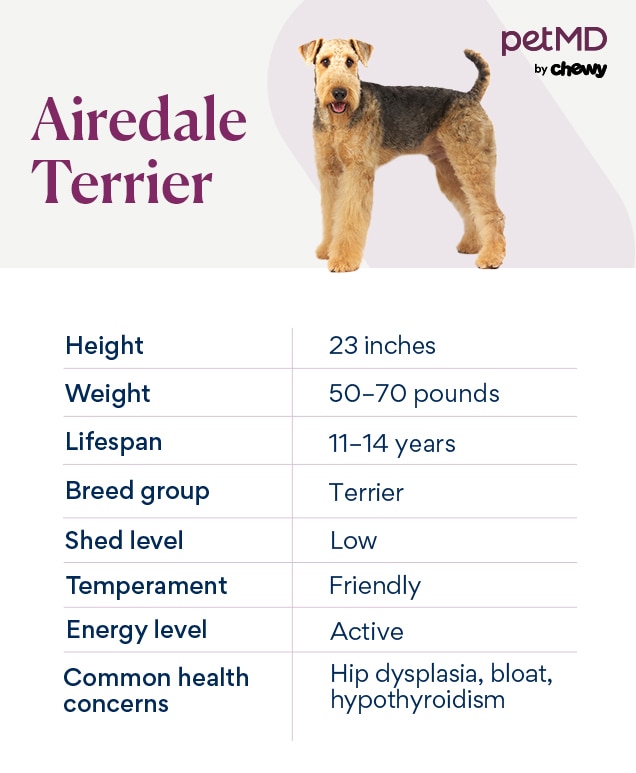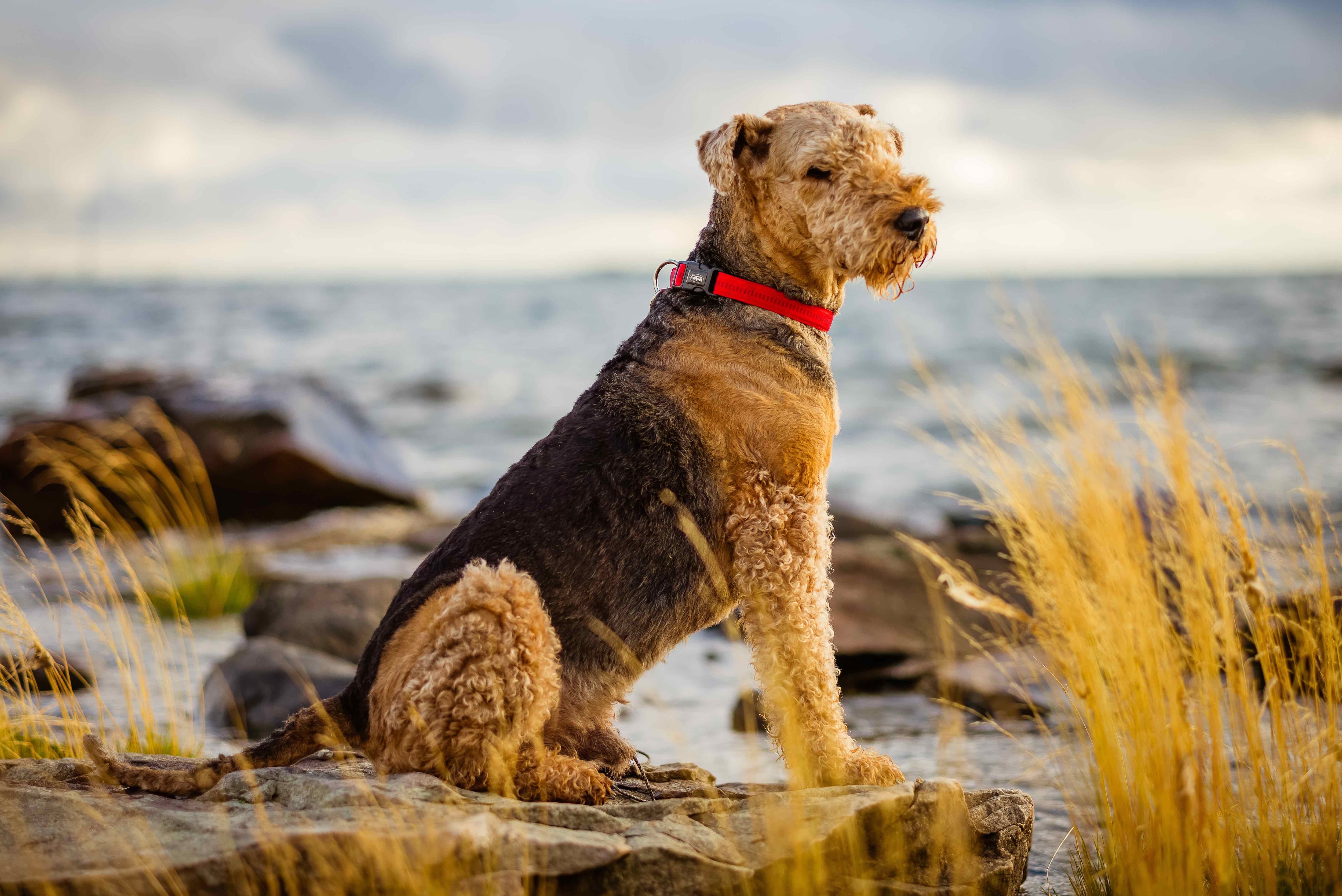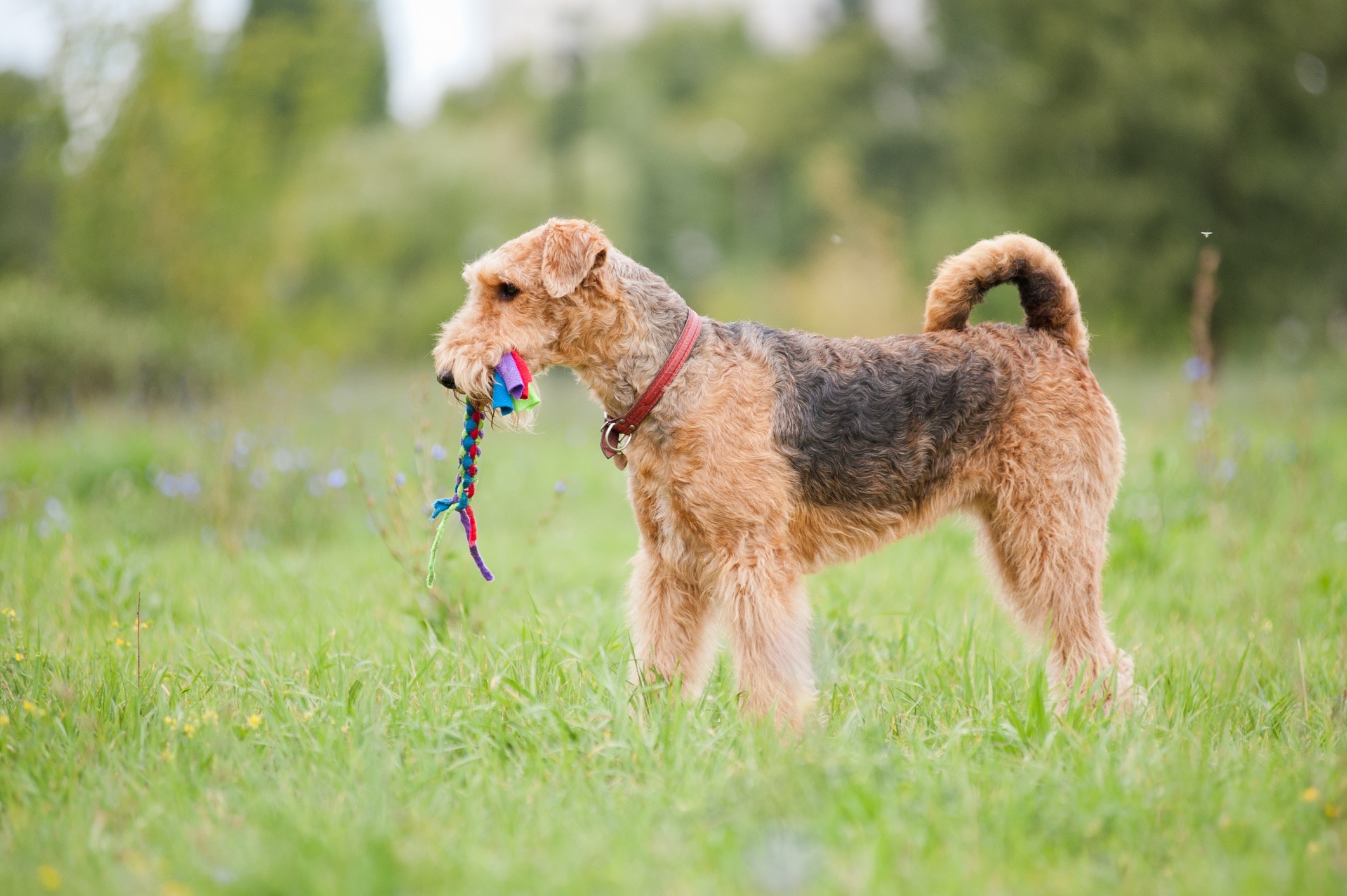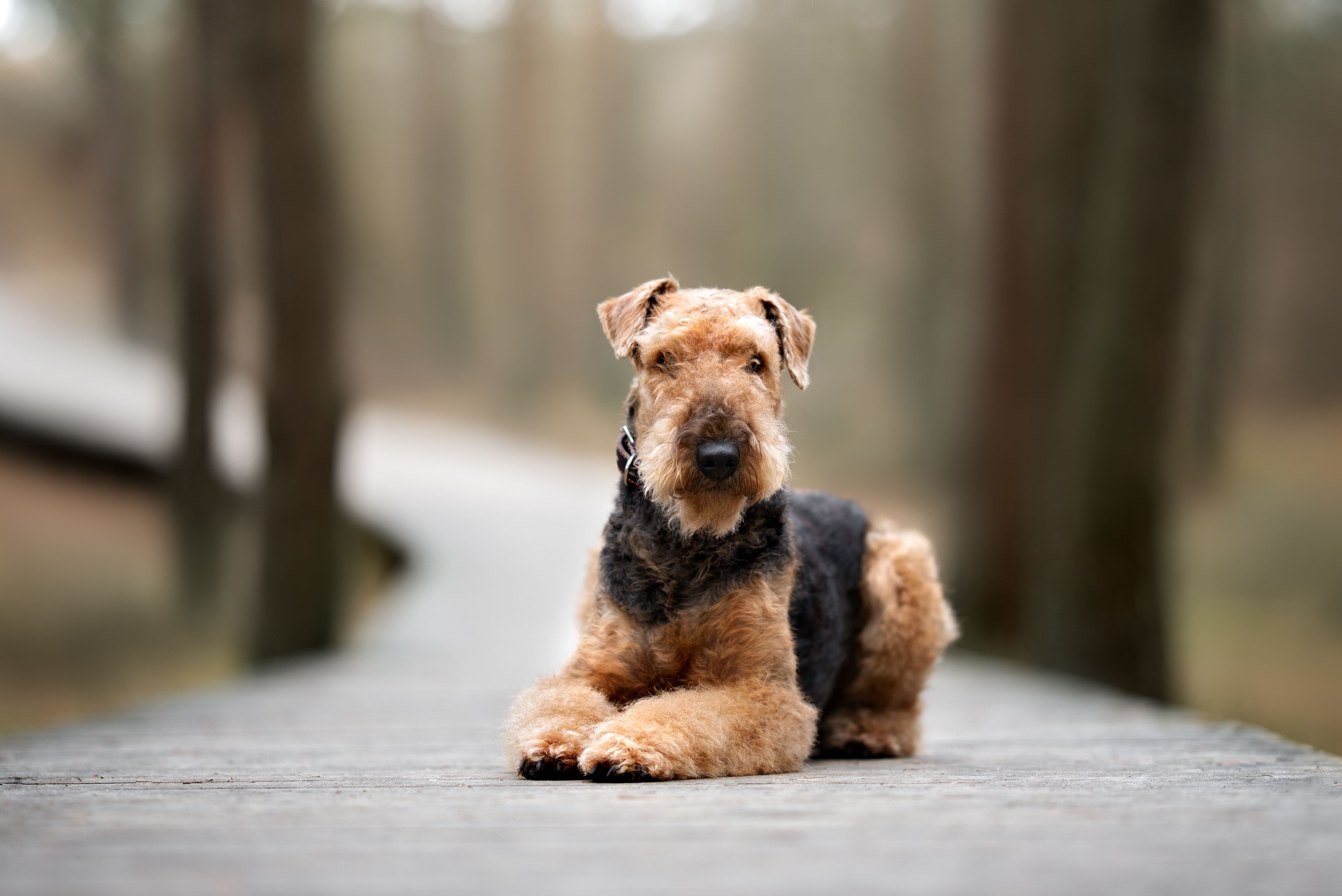Airedale Terrier
iStock/Alex Potemkin
The sturdy Airedale Terrier is the largest terrier breed, earning them the nickname “The King of Terriers.” The breed originated in England and is likely a cross of a variety of terriers. The result? A hearty dog The Airedale Terrier Club of America (ATCA) calls a “Jack of All Trades.”
The breed’s history shows their versatility: They’ve been used to hunt, guard, and work with police for decades. The Airedale stands about 23 inches at the shoulder and weighs 40–60 pounds. They sport a jaunty beard and have a brown-and-black coat of dense, wiry hair.
Caring for an Airedale Terrier

The Airedale Terrier is an active and inquisitive breed that needs attention, exercise, and adoration to thrive. While they shed very little, their double-layered wiry coat requires regular grooming and care.
Airedales learn quickly, which is a boon and a challenge for training. They’ll pick up new tricks quickly, but this large-breed terrier can also latch on swiftly to bad habits. Positive reinforcement and lots of patience are needed to teach them good manners—and what is and is not a chew toy. But overall, an Airedale is a great addition to many families who have the time to give them the attention they deserve.
Shop for Your Breed
Airedale Terrier Health Issues
Airedale Terriers are generally sturdy and healthy pets, though they can suffer from conditions common in dogs, according to the ATCA. The typical life expectancy for the King of Terriers is 10–13 years.
Hip Dysplasia
Airedales can develop hip dysplasia, a hereditary condition where the hip joint develops abnormally, becoming loose and causing pain. Symptoms of hip dysplasia include limping, popping joints, bunny-hopping while running, and abnormal sitting positions.
The condition can be treated with medications or with surgery, depending on the severity. The breed club recommends asking your Airedale Terrier breeder about all health screenings, including hip dysplasia, done for your Airedale puppy and parents.
Bloat
As the largest breed of terrier, Airedales can develop gastric dilatation-volvulus (GDV), a severe form of bloat in dogs. Dogs can bloat when food or gas causes their stomach to expand, and GDV occurs when the stomach twists on itself and/or the spleen. This dangerous condition can be caused by eating too quickly or exercising immediately after eating.
GDV is a life-threatening medical emergency and should be treated immediately. Airedale Terrier pet parents need to be aware of the signs of GDV and bloat, which include:
-
Dry heaving
-
Retching
-
Pacing
-
Stomach distension
-
Collapsing
-
Pale gums
Hypothyroidism
Hypothyroidism occurs when a dog’s thyroid stops producing enough hormone, causing a slowdown in metabolism and other bodily functions. Symptoms of the disease include sluggish behavior, weight gain, chronic skin and ear infections, and hair loss. Though it can’t be cured, hypothyroidism can be treated with lifelong medication and frequent checkups with the veterinarian.
What To Feed an Airedale Terrier

Airedales thrive on high-quality, high-protein dog food. Your veterinarian can help you pick a brand approved by the Association of American Feed Control Officials (AAFCO). Airedale Terrier puppies need to eat a good puppy food until they’re about 1 year old, when they can transition to adult food.
How To Feed an Airedale Terrier
Never allow an Airedale 24/7 access to food, the breed club warns. Free-feeding your dog can allow them to become obese, which can lead to other health issues. Airedale puppies should generally receive three meals a day on a regular schedule, which can be lowered to two daily meals when they reach 1 year old.
Because Airedale Terriers are susceptible to bloat, always avoid exercise right before and after mealtimes, and do not feed your dog from a raised bowl. Letting them eat from a slow-feeder bowl can help slow down the scarfing, further reducing the chances of bloat.
How Much Should You Feed an Airedale Terrier?
The amount of food your Airedale Terrier will need depends on their size, age, and activity level. Use the label on your dog food packaging for guidance, and talk to your veterinarian about how much you should be feeding your pup.
Nutritional Tips for Airedale Terriers
While dogs get all the nutrients they need from their well-balanced dog food, some Airedale Terriers may benefit from supplements, such as fish oil, to help with dry and itchy skin. Always talk to your vet before giving your dog supplements or adding something new to their diet.
Behavior and Training Tips for Airedale Terriers
Airedale Terrier Personality and Temperament

Airedale Terriers are smart, jolly, and loyal dogs that love to make their pet parents smile with their shenanigans. But all that intelligence and spunk means they should not be left to their own devices for too long. Airedale dogs—and especially Airedale puppies—need exercise and benefit from several walks or games of fetch a day. They can adjust to many living environments, but thrive if they have a fenced yard to run around in.
Airedales are more reserved than other terrier breeds, according to the breed club, but they aren’t shy. They make great family dogs and, if trained well, generally get along with children, dogs, and other pets.
Airedale Terrier Behavior
Airedales are deeply curious dogs that love to investigate anything that catches their attention. Any item that could be potentially interesting—like a newspaper, cardboard box, or bag of chips—should be kept out of an Airedale’s reach when they’re unsupervised.
While not particularly anxious or vocal, Airedales are known to dig, so be wary of leaving them in the backyard unattended, the breed club advises. Giving your Airedale Terrier lots of engaging toys and keeping them well-exercised will help deter unwanted behaviors that can arise from boredom.
Airedale Terrier Training
Because Airedale Terriers are smart puppies, they will not do well with repetitive (and often boring!) training sessions. But this easily bored, super intelligent dog loves to learn—and excel at—obedience drills and new tricks. Like all dog breeds, Airedales do best with positive reinforcement. Vary your training sessions to keep things interesting for them, and give them lots of rewards when they follow your cues. As the ATCA says, “Remember, Airedales are thinkers, not robots.”
Airedales are deeply curious dogs that love to investigate anything that catches their attention. Any item that could be potentially interesting—like a newspaper, cardboard box, or bag of chips—should be kept out of an Airedale’s reach when they’re unsupervised.
Fun Activities for Airedale Terriers
Airedale Terrier Grooming Guide
The Airedale Terrier’s hard, wiry exterior coat covers an underlayer of softer, thicker hair. The breed sheds very little, but they need semiregular grooming to keep their stately look.
Skin Care
Some Airedales’ skin can become dry and/or itchy, according to the ATCA. Pet parents can help their Airedale Terrier remain comfortable by adding supplements to their food as directed by their vet. If a change in diet doesn’t help, take your pup to the vet to check for any medical conditions that might be causing the discomfort.
Coat Care
Airedale Terriers should go to a professional groomer three or four times a year, according to the breed club. The groomer will help keep the outer coat from looking shaggy while also removing dead hair from their undercoat.
At home, a good brushing a few times a week will keep your Airedale’s coat healthy—and make them feel loved. The Airedale’s coat can develop mats, which should be broken apart by hand, then carefully untangled with a comb.
If your Airedale dog needs a bath, there’s no need to use a conditioner. Their coat naturally produces oils that will keep it healthy.
Eye Care
Airedale dogs’ eyes should be wiped clean of drainage. Pet parents should also trim long hair around their dog’s eyes that may become dirty or block their vision. If you notice anything abnormal about your dog’s eyes, such as discharge, talk to your vet.
Ear Care
To prevent ear infections and irritation, keep your Airedale’s ears clean and dry. A quick swab with a cotton ball or dog-specific ear cleaner every week should keep ears healthy and happy.
Considerations for Pet Parents

Raising an Airedale Terrier—especially an Airedale puppy—is a serious time and energy commitment. Prospective terrier parents must be willing to engage in regular training and to exercise their new family member every day. Airedales thrive with a yard to run in and regular outdoor excursions where they can expend energy. Airedales can be great family pets, as long as both children and your new puppy are taught to respect each other.
Airedale Terrier FAQs
Are Airedale Terriers good family dogs?
When well-trained and socialized, Airedale Terriers can make excellent and gentle family dogs. All interactions between children and dogs of any breed should always be supervised, and kids should be taught how to properly interact with animals.
Are Airedale Terriers high maintenance?
Airedales require regular grooming, exercise, and stimulation. They aren’t anxious dogs—but, like all pets, they need affection and attention to thrive.
Do Airedale Terriers shed?
Airedale Terriers are not considered to be hypoallergenic and do shed, though minimally. Because of this, some people with allergies are able to live with well-groomed Airedales. Before bringing home an Airedale Terrier puppy, spend time with the breed to see how your allergies react.
